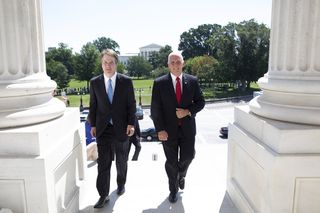Reducing Regulation Will Outweigh Net Neutrality During Kavanaugh's First Term
Brett M. Kavanaugh has won Senate confirmation to become an associate justice of the Supreme Court and will take his seat on Tuesday, October 9.

In a rare and contentious Saturday session, the Senate voted 50 to 48 to approve Kavanaugh, a federal District Judge, for the seat previously held by Anthony Kennedy. Within hours after the confirmation vote, Chief Justice John Roberts administered the oath of office to the 53-year-old Kavanaugh after President Trump signed the appointment commission.
The new Justice -- 114th in the Court's history -- will take his seat on the far right side of the bench when the Court opens for business after the Columbus Day (also known as "Indigenous Peoples Day") weekend, establishing a solid 5-4 conservative majority on the Court for the first time in decades.
Although Kavanaugh has discussed his dissent on Network Neutrality, the Supreme Court's agenda for the coming term now has very few cases dealing with technology, telecommunications or media. Several cases scheduled to come before the Court may produce decisions that affect these sectors though -- especially the regulatory aspects. Kavanaugh's background has spurred speculation on how he will vote, but at this point there is no way to know how the court will rule on these cases.
Most notably, Gundy v. United States, will examine how Executive Branch Departments and independent federal administrative agencies -- such as the FCC or FTC -- handle powers that, it is argued, should be retained by Congress. Although the case does not involve current telecom/media or technical issues, the Court's decision may be a sign of a crackdown on excessive federal agency actions.
Similarly, in Apple, Inc. v. Pepper the Court will determine how to treat iPhone users who buy apps from Apple’s App Store. More broadly, the case could affect the rights of customers who purchase a good or service from a third party if allegedly abusive monopolist practices are involved..
Other SCOTUS cases this term involve property rights, the Fifth Amendment’s Double Jeopardy Clause and abusive class-action settlements. The Court is also expected to hear an unusually large number of appeals seeking to overturn legal precedents in a variety of fields.
Key Senators are Not Directly Involved in Commerce Issues
The unusual 50 to 48 vote to confirm Kavanaugh came as Senators used a legislative loophole to assure that the new Justice won by two votes. Sen. Lisa Murkowski (R-Alaska), the only Republican not to vote for Kavanaugh, voted "present" rather than "no." That tactic offset a missing "yes" vote from Sen. Steve Daines (R-Montana) who could thereby skip the voting to attend his daughter's wedding on Saturday.
After an impassioned speech on Friday in which Sen. Susan Collins (R-Maine) said she would support Kavanaugh, extensive attention focused on Murkowski and Sen. Joe Manchin (D-West Virginia), the only Democrat to cross party lines and vote for Kavanaugh. These key Senators (Murkowski, Collins and Manchin) coincidentally all serve on the Senate Appropriations Committee. None of them currently is involved with the Senate Commerce, Science and Transportation Committee.
Multichannel Newsletter
The smarter way to stay on top of the multichannel video marketplace. Sign up below.
Contributor Gary Arlen is known for his insights into the convergence of media, telecom, content and technology. Gary was founder/editor/publisher of Interactivity Report, TeleServices Report and other influential newsletters; he was the longtime “curmudgeon” columnist for Multichannel News as well as a regular contributor to AdMap, Washington Technology and Telecommunications Reports. He writes regularly about trends and media/marketing for the Consumer Technology Association's i3 magazine plus several blogs. Gary has taught media-focused courses on the adjunct faculties at George Mason University and American University and has guest-lectured at MIT, Harvard, UCLA, University of Southern California and Northwestern University and at countless media, marketing and technology industry events. As President of Arlen Communications LLC, he has provided analyses about the development of applications and services for entertainment, marketing and e-commerce.

